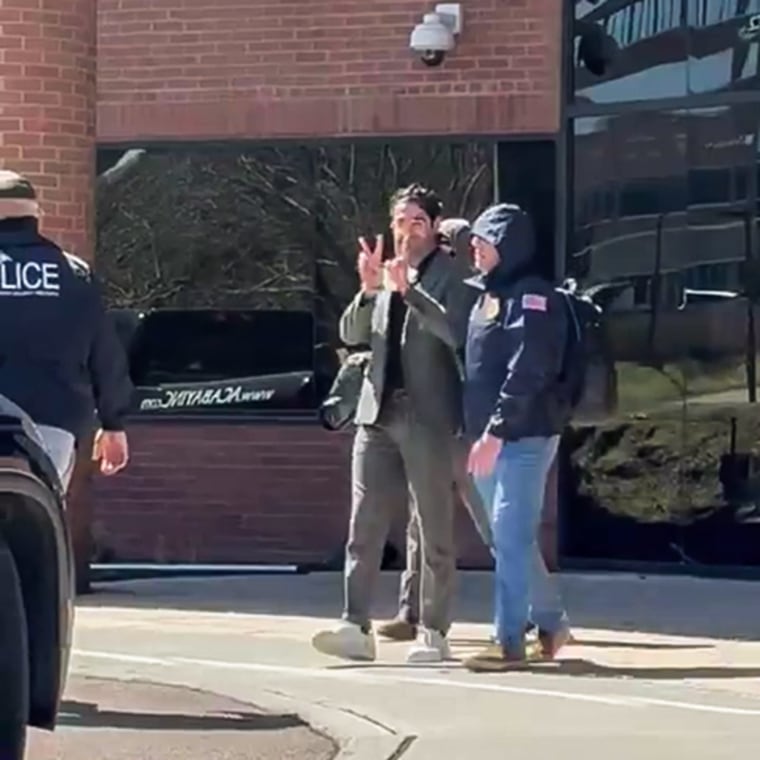Judge says Trump administration can’t move detained Palestinian student out of Vermont
A federal judge blocked officials Wednesday from moving a Palestinian student from Columbia University who was taken into custody during his naturalization interview in Vermont.
U.S. District Judge Geoffrey W. Crawford extended a previous temporary restraining order that keeps the student, Mohsen Mahdawi, in the state, where he is a resident. Mahdawi is being held at an Immigration and Customs Enforcement facility in Vermont.
Lawyers for Mahdawi, a pro-Palestinian activist, had filed a motion for his release, arguing that he is not a flight risk.
“Mr. Mahdawi has deep community ties, a long history of being actively invested in the peace process, and nearly 80 individuals who can attest to his character,” the filing said.
However, Crawford declined to rule whether the federal government can continue to detain Mahdawi, or whether the court has jurisdiction over his habeas petition challenging his detention. The judge set a hearing for next week, at which he could decide to release him.
Mahdawi, who was born and raised in a refugee camp in the West Bank and is a U.S. permanent resident, was taken into custody last week by armed agents from the Department of Homeland Security.
Mahdawi walked into what he thought was the “final stage” of the long pathway to citizenship, raising his right hand, answering questions and signing a document that “he was willing to defend the Constitution and laws of the United States of America,” his attorneys said in court filings.
“It was a trap. At approximately 12:00 P.M., the USCIS official informed Mr. Mahdawi that he needed to ‘check’ on some information and would be right back,” the court filings said. “ICE agents, masked and visibly armed, entered the interview room and shackled Mr. Mahdawi.”

Following the brief hearing Wednesday, Mahdawi said he did not want his supporters to lose hope and called on people to “believe in the inevitability of justice.”
“This hearing is part of the system of democracy; it prevents a tyrant from having unchecked power. I am in prison, but I am not imprisoned,” Mahdawi said in the statement. “A system of democracy guarantees freedom of speech, speaking of Palestine does not only qualify as freedom of speech, but it is also about our humanity. Keep the hope alive; I will see you under the sun.”
Mahdawi’s attorney, Cyrus Mehta, accused the Trump Administration of being “hellbent on detaining these students and treating them like criminals simply for exercising their First Amendment right to freedom of speech.”
“We will continue to fight for Mohsen to be rightfully returned to his community in Vermont,” Mehta said in a statement.
DHS spokesperson Tricia McLaughlin did not comment on the temporary restraining order or elaborate on Mahdawi’s case. But she said in a statement that it is a “privilege” to be granted a visa or green card.
“When you advocate for violence, glorify and support terrorists that relish the killing of Americans, and harass Jews, that privilege should be revoked, and you should not be in this country,” McLaughlin said.
The Justice Department declined to comment.
In the DHS notice for Mahdawi to appear, officials said Secretary of State Marco Rubio had “determined that your presence and activities in the United States would have serious adverse foreign policy consequences and would compromise a compelling U.S. foreign policy interest,” the court filing said.
Mahdawi’s attorneys have said that the government’s actions are retaliatory.
“Prior to and following Mr. Mahdawi’s detention, the government has made clear that it intends to retaliate and punish individuals such as Mr. Mahdawi who advocated for ceasefire and ending the bloodshed in Gaza,” their filing said. “Respondents’ actions plainly violate the First Amendment.”
Mahdawi grew up in the al-Fara’a refugee camp, where he witnessed Israeli military violence, according to court filings. At 15, the documents said, he was shot in the leg by an Israeli soldier. Mahdawi, who immigrated to the U.S. over a decade ago before attending Columbia University in 2021, became a key organizer of pro-Palestinian protests at the school last year.
“He gave speeches at several of these protests. In these speeches, Mr. Mahdawi advocated for respect for international law, a permanent ceasefire, and a peaceful resolution that affirmed the human dignity of all,” the court filings say.
While Mahdawi lives in the U.S., much of his family still remains in the refugee camp, and Israeli authorities have repeatedly harassed them because of his advocacy, the filing says.
“Mr. Mahdawi is fearful that, if he loses his lawful permanent resident status and he is removed to the West Bank, he will experience the same harassment, detention, and torture that his family has experienced, and would be in even more danger in light of the campaigns that have targeted and spread lies about him,” the filing said.
Mahdawi’s case has prompted widespread criticism of the Trump administration and its stance on free speech. On Monday, Sen. Peter Welch, D-Vt., visited Mahdawi at the ICE facility.
“I want to tell everyone that I feel so loved and so supportive, and I am here in good hands,” Mahdawi told Welch during the meeting. “I am centered, I am clear, I am grounded, and I don’t want you to worry about me. I want you to continue working for the democracy of this country and for humanity.”



